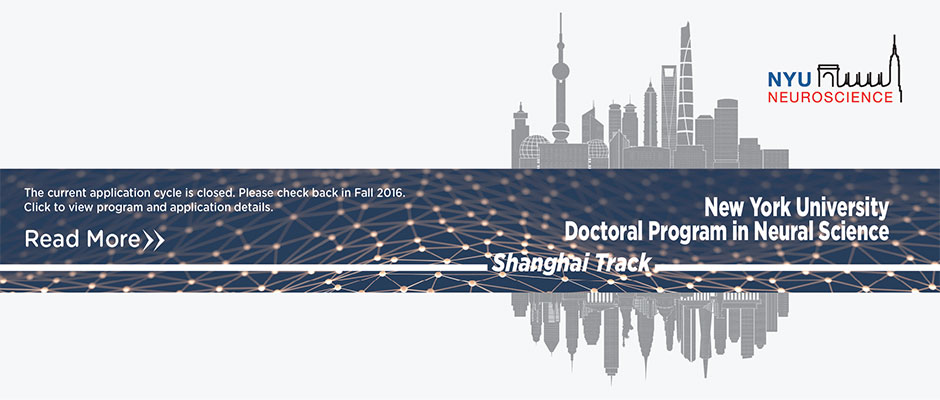Doctoral Program

Overview of NYU Doctoral Program in Neuroscience Shanghai Track
New York University is recruiting doctoral students through the Shanghai track of the Doctoral Program in Neural Science. NYU Shanghai and its partner East China Normal University jointly operate an Institute of Brain and Cognitive Science. IBCS has a broad vision, the areas of research include neural circuit mechanisms of cognitive function (such as decision-making and human language), and inter-disciplinary computational neuroscience.
Students in the Shanghai track will spend one and half years at NYU in New York for course work and laboratory rotations, before joining a laboratory in Shanghai for thesis research. They will maintain a close tie with New York, and they will receive an NYU Ph.D. To apply NYU Doctoral Program in Neuroscience Shanghai Track, please click here.
Core Graduate Components
Research Training
We strongly emphasize research at the highest level throughout graduate school, and students on the Shanghai track participate in research from the very beginning of graduate training, working in both Shanghai and New York. At the outset of training, students will spend two consecutive summers rotating with faculty in Shanghai and the intervening academic year rotating with a lab in New York. By the beginning of the second year, students typically select a lab and primary advisor in Shanghai for their thesis work as well as a co-mentor in New York. Students continue to have opportunities to work and collaborate with colleagues in New York throughout their training.
Coursework
A core curriculum in neuroscience, taken during the academic year spent in New York, gives students a broad and in depth understanding of the nervous system, from molecules to systems. The three core courses – Cellular Neuroscience, Neuroanatomy, and Sensory and Motor Systems – include lectures, student-led discussions, and hands-on components. In addition, all students take a course in biostatistics as well as advanced electives. Students also benefit directly from the interactive, collegial communities in both New York and Shanghai and become active participants in shaping the rich, intellectual environment – including seminars, retreats, and colloquia – that complements formal training.
Mentoring and Milestones
Students are advised by the graduate program director and additional faculty advisors in the first year of the program. Once a primary research mentor in Shanghai and co-mentor in New York are selected, they advise students together with a thesis committee. In the third year, students write and defend a qualifying exam (thesis proposal). The dissertation defense typically occurs in the fifth year in front of the thesis committee and additional faculty, including an outside expert.



 沪公网安备31011502017015号
沪公网安备31011502017015号